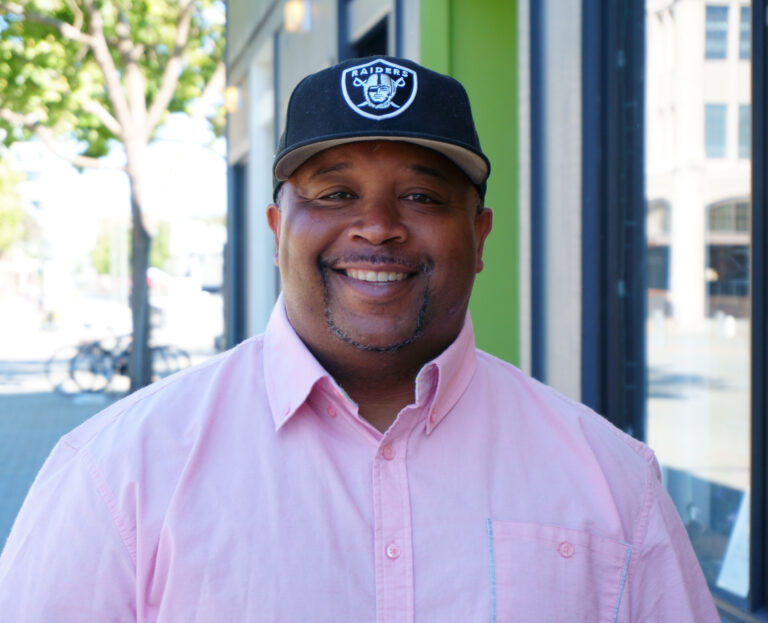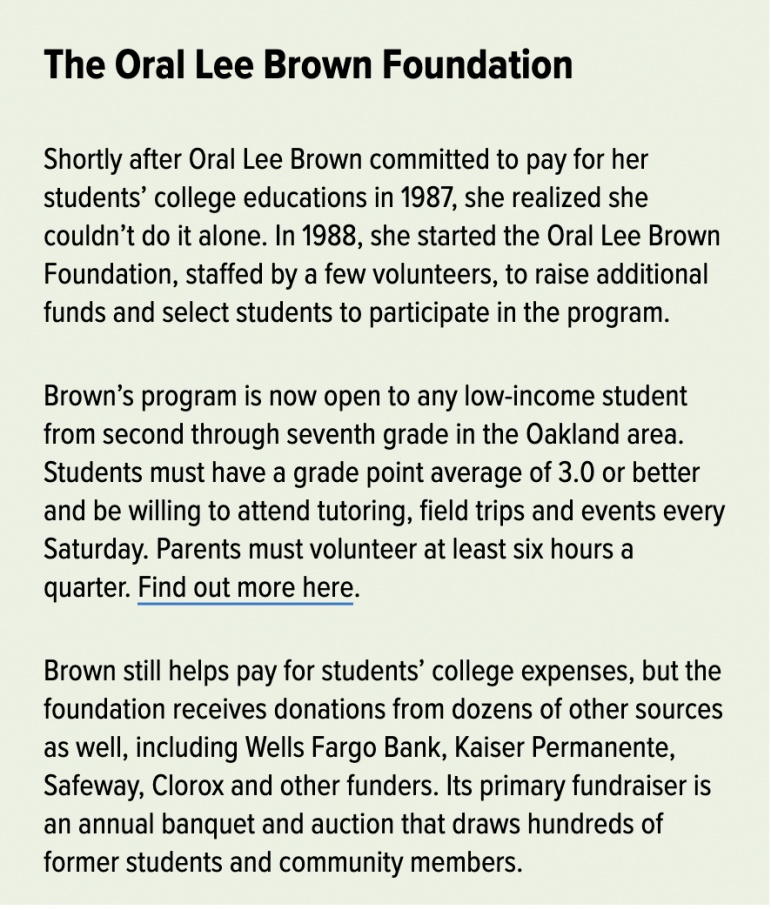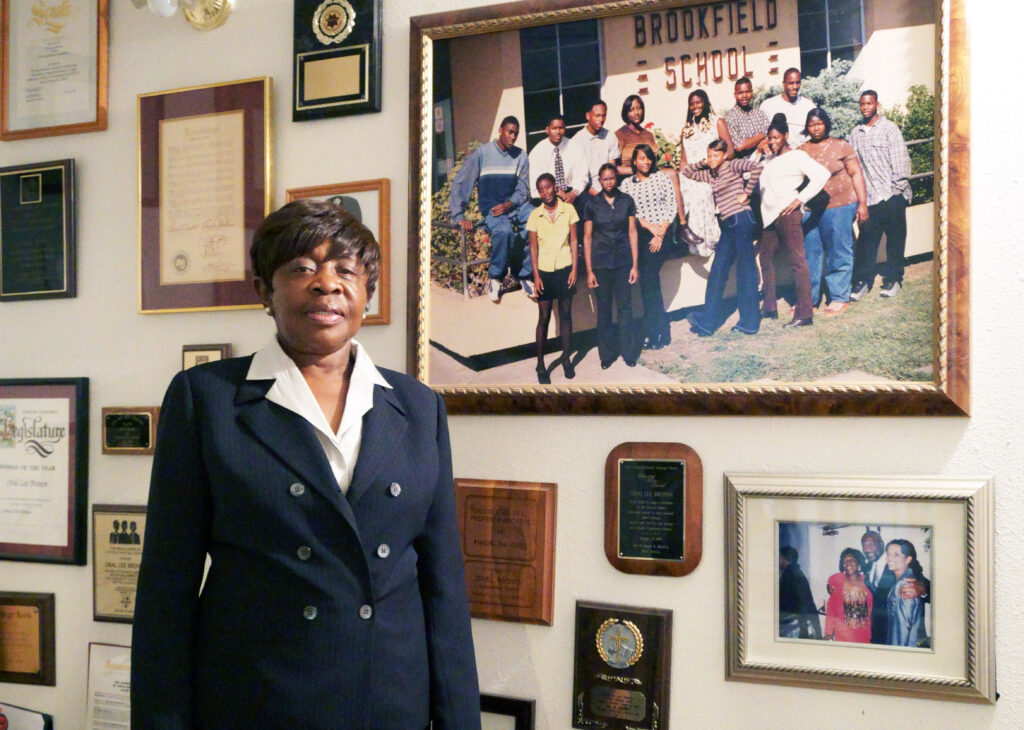For Gov. Gavin Newsom and anyone else promoting college savings accounts for low-income children, Oral Lee Brown has some advice:
“It’s not about the money.”
Brown, an Oakland real estate agent now in her 70s, has been promoting the same idea since 1987, when she “adopted” a class of first graders from Brookfield Elementary School in East Oakland, promising to pay their college costs if they stayed in school.

Of that original class of 23, one went to work, two died of gunshot wounds, one went to culinary school and 19 went to college — a college-going rate that rivals the highest-achieving districts in California. At the time, Brown’s students vastly outperformed their peers. In the 1990s Oakland Unified had some of the lowest test scores and highest dropout rates in California.
Since then, Brown has ushered more than 120 low-income Black and Latino students through school, with 80-90% graduating from college debt-free. And as philanthropies, cities and states — including California, with its forthcoming CalKids program — rush to create similar programs, Brown is eager to share her reflections.
The Oral Lee Brown Foundation
Shortly after Oral Lee Brown committed to pay for her students’ college educations in 1987, she realized she couldn’t do it alone. In 1988, she started the Oral Lee Brown Foundation, staffed by a few volunteers, to raise additional funds and select students to participate in the program.
Brown’s program is now open to any low-income student from second through seventh grade in the Oakland area. Students must have a grade point average of 3.0 or better and be willing to attend tutoring, field trips and events every Saturday. Parents must volunteer at least six hours a quarter. Find out more here.
Brown still helps pay for students’ college expenses, but the foundation receives donations from dozens of other sources as well, including Wells Fargo Bank, Kaiser Permanente, Safeway, Clorox and other funders. Its primary fundraiser is an annual banquet and auction that draws hundreds of former students and community members.
Namely, that money alone does not guarantee a child’s success in school, especially if that child faces a gauntlet of other obstacles related to poverty and generational trauma.
“To me, the money is the least of it,” Brown said during a recent interview at her 99th Avenue office, where she’s run her real estate business for 42 years. “Kids need guidance, support, someone to talk to. … That’s why my kids succeed. They never say, ‘Ms. Brown, thanks for the money.’ They say thanks for the love and support.”
Brown didn’t realize that in 1987, however. Initially, Brown thought she was making a straightforward financial commitment, a promise to put $10,000 a year into a bank account for future tuition payments.
But as she got to know the children, and they started asking her for things like food and shoes and occasionally a bed to sleep on, she realized the need was far greater and far more complicated.
Her college tuition promise turned into a 24-hour-a-day vocation, which she embraced even as she raised her own two daughters and ran her business.
She hired tutors to keep her students on track academically, took them to ride the cable cars in San Francisco and see the Monterey Bay Aquarium, flew them across the country to tour colleges, drove them to and from school when they needed rides, bought them Christmas presents and answered her phone at all hours if they just needed to talk.
Her former students, who call her “Mama Brown,” say her commitment to them was nothing short of life-saving.

“Honestly, if it wasn’t for Mama Brown, I’d be behind bars or under dirt,” said Jeffery Toney, 40, an Oakland writer and musician who was among Brown’s first class of first graders. “Mama Brown is my real-life angel.”
Poised and sharply dressed, Brown seems like a typical busy, successful real estate agent. Her office, on a corner of Oakland known as Deep East, is immaculate and orderly, with walls covered in framed awards and photos.
Among them are honorary degrees, photos of Brown and her students with celebrities, news clippings about Brown’s work, including a 2002 Woman of the Year spread in Glamour magazine and dozens of graduation photos.
But the poverty and hardship are never far from her mind. A native of Batesville, Mississippi, Brown grew up on a cotton farm, one of 12 children sharing a two-bedroom house with no electricity or running water. She walked 3 miles each way to school. When she wasn’t studying, she picked cotton and corn and tended to the family’s hogs.
Jim Crow segregation laws were in full effect, impacting nearly all aspects of life for Black people. Brown remembers walking down the sidewalk with her mother and having to step into the street to let a white person pass. One day, when Brown hesitated, her mother said, “We need to get you out of here or you’ll get us all killed.”
Even at a young age, Brown was eager to get out.
“I can remember standing in a cotton field saying, ‘God, get me out of Mississippi. I will do whatever you want me to do. Just get me out,’” Brown recalled.
When she was a teenager, her parents sent her to live with an older sister in Newburgh, New York, where she graduated from high school. From there, she visited a brother who had moved to Oakland, and she never left.
She got married, went to community college and eventually earned a bachelor’s degree from the University of San Francisco while raising her two daughters.
One day in 1987, she was walking to the corner store on 94th Avenue to buy a Pepsi and a bag of peanuts, like she did every day, and a girl asked her for money. Brown said she’d buy her a treat, but the girl picked out a loaf of bread, cheese and bologna.
“We walked out, and I said, ‘Where is your mother?’ She said, ‘I don’t know.’ I said, ‘Do you go to school?’ She said, ‘Sometimes.’ And she almost, like, froze. So I didn’t say another word to her. We crossed the street. She made a right and went down 94th Avenue, and I went back to my office,” Brown said. “But I kept thinking about her.”
A few days later Brown tried to find her at the local elementary school. After meeting the principal, Brown visited a few classrooms but never found the girl. But she was struck by the scale of the need. All the children seemed just as impoverished as the girl she met outside the corner store.
Somewhat spontaneously, she promised to pay for the college education of every student in a class of first graders that the principal said was the most disadvantaged. She agreed to put aside $10,000 a year — a quarter of her income— for the purpose.

And then, after that class graduated, she adopted another group of students. She’s now on her third cohort. A nonprofit, the Oral Lee Brown Foundation, now handles the fundraising and day-to-day operations, while Brown keeps up with her students and alumni. She never misses a college graduation.
“The one thing I felt I could give these kids, that would last them a lifetime, was an education,” she said. “Money doesn’t always last, but no one can take an education away from you. With an education, you can make decisions. You can get a good job. You can have a voice.”
LaQueta White, 38, was among the first crop of Brown’s students in 1987. At the time, White was living with her four sisters and her mother in East Oakland, and money was almost nonexistent.
White was a good student and wanted to go to college, but without Brown’s help and encouragement it probably would have been impossible, she said. Her friends who had to borrow money and work throughout their college years struggled, and some never graduated or were saddled with debt. With Brown paying her college bills, White was spared those hardships.

“Without her, life would have been a lot more difficult for me,” White said. “My whole family is so appreciative of everything she did for me. All of us, we love and adore her.”
White graduated from San Jose State University and now works as a supervisor in a maternal and fetal medicine department for Kaiser Permanente.
She has a 9-month-old son, and still considers Brown a role model.
Like White, Daishar Young, 31, was also a motivated student, but college seemed far-fetched. His mother died of complications related to asthma when Young was 13, and he moved in with a godmother in North Richmond.

Every day for five years, he took the train and bus for 1½ hours each way to school and see Brown in Oakland.
“Ms. Brown was like another parent for me,” Young said. “She gave us a lot more than money. It was her energy, her love, that got me through. … When you have your head down, she gives you a reason to lift your head up.”
Young went on to earn a bachelor’s degree from the University of California, Berkeley, and a master’s in education from the University of Michigan. He’s now building a business promoting bicycle transportation.
Cherrish Cook, 19, a sophomore at Sacramento State, joined Brown’s program when she was in middle school, after Brown expanded eligibility to second through seventh graders.
Although Cook always wanted to go to college, Brown’s encouragement and support helped her stay focused and keep her grades up.

But more important than academic guidance was Brown’s influence as a role model, Cook said. One day Brown was describing her childhood in Mississippi to some students and broke down in tears.
“It was like she was saying, here are my tears. Crying is a way of releasing,” Cook said. “I thought, wow, I am in the presence of a Black woman who’s strong and independent and not afraid to be vulnerable. For me, that meant a lot.”
Cook hopes to someday go to law school and give back to her community in East Oakland as Brown has.
“She gave me a sense of direction. She made me believe I can accomplish anything with my life,” Cook said. “I cherish her. She is a light for me.”
Nekita Noel-Ikulala, 40, can pinpoint the exact moment Brown changed her life trajectory. Noel-Ikulala, who grew up in public housing in East Oakland, felt like she had conquered the world when she headed off to Chico State University as a freshman — but within two hours of arriving on campus, she was desperate to come home.
As one of only a few hundred Black students at the school, Brown felt the lack of diversity and cultural differences were too difficult to navigate, she said.

“It was absolutely the wrong school for me. I was ready to give up,” Noel-Ikulala said. “I wanted my mom to come get me. I called Mama Brown and she said, ‘You can do this. You got this.’ And she told my mom to leave me there.”
Without that push, Noel-Ikulala is certain she would have left Chico and probably abandoned her college plans. Instead, she stayed for two years and then transferred to Sacramento State, where she earned a bachelor’s degree.
Since then, she’s earned two master’s degrees and now works as a social worker in Sacramento.
“Ms. Brown kept me on track,” she said. “She was literally always there for me when I needed her.”
Jeffery Toney’s story is a little different from Brown’s other students. He was not particularly motivated to go to college, he said. Although he had decent grades, he spent much of his adolescence selling drugs and committing other crimes — what he felt he needed to do to survive. Homeless as a teenager, he needed money for food, clothing, bus fare, school supplies. College was not on his radar.
But Brown pushed him hard toward college. She took him to Atlanta to visit Morehouse, a top historically Black college, and other elite East Coast schools.
At her urging, he applied and was accepted to Columbia College in Chicago. He graduated with a degree in business management and then earned a certificate in music business through UCLA Extension. A writer and musician, he now runs a recording studio and clothing line in Oakland and has a 5-year-old daughter.
“The lifestyle I was living, I was going to end up dead or in jail,” he said. “But she snatched me up. She never lost faith in me. And I embraced that, 100 percent.”
. . .
Brown hopes to retire from real estate next year, but she has no plans to give up her work with young people. She still answers her phone day and night, offering advice and encouragement and just listening.
Sometimes, students call her who aren’t even in her program. One day a girl in Texas called, asking for Brown’s support for college. Brown demurred, explaining that she had to set some limits. After all, the foundation’s resources are not infinite.
But then Brown changed her mind.
“When a child knocks on your door, and they have good grades, and they want to go to college, who am I to say no?” she said. “Who am I to say no to a child who wants an education? To me, it’s a no-brainer.”
